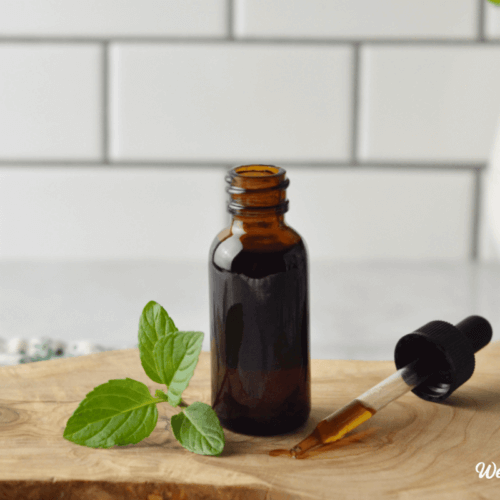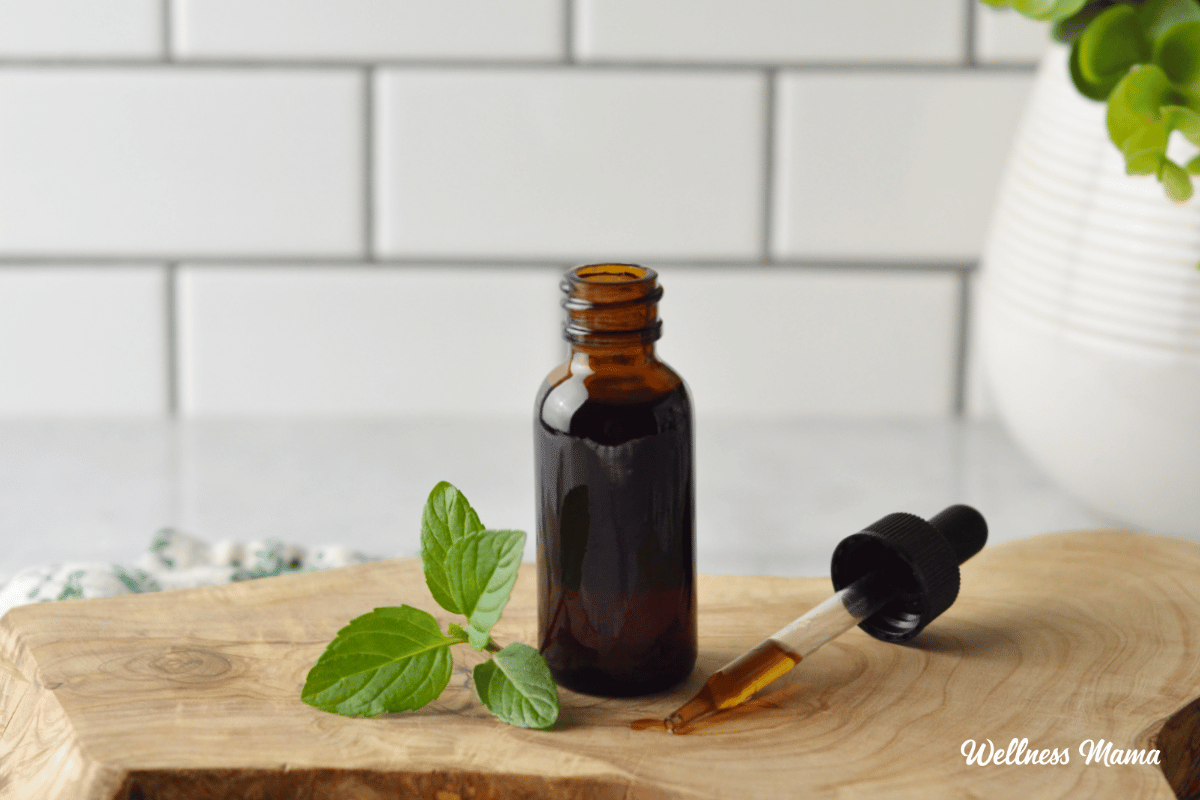Table of contents[Hide][Show]
This digestive tincture is by far the most used tincture in my home remedies cabinet. It’s simple to make, yet effective in solving many digestive problems. If you’re dealing with bloating, irritable bowel syndrome, or just need digestive support, read on.
Digestive Bitters for Gut Health
In modern diets, sugar or salty tastes are often the protagonists. We no longer naturally rely on large amounts of bitterness to flavor our food. If you’ve ever eaten dandelion leaves or lettuce, then you know what they taste like. Other common digestive bitters include rosemary, orange peel, and coffee. Bitters help digestive health in a few different ways.
These herbs increase the digestive secretions throughout our digestive tract. It all starts with the tongue. Once we taste the bitter herb, it gets our saliva flowing and aids digestion in the ensuing process. They also trigger the flow of bile from the gallbladder to aid in the healthy digestion of fats.
Aromatic Herbal Blend
Another class of herbal teas and medicines that support digestion are aromatics. These scents are more pungent and more concentrated in volatile oils, such as mint, anise, and black pepper. Like bitters, they aid digestion, but in a different way. Their volatile oils send relaxation signals to our smooth muscles and tell our nervous system it’s time to settle down and digest.
herbal tincture ingredients
For this digestive tincture blend, I used a blend of mint, ginger, and fennel.
Mint
Mint is delicious in peppermint chocolate chip ice cream, but it’s also great for soothing the digestive system. People with acid reflux may need to proceed with caution, though. Medicinal amounts of peppermint can soften the esophageal sphincter and trigger heartburn in those who are already prone to heartburn. If you find that using this tincture causes heartburn or reflux, try it without the peppermint.
Peppermint helps with upset stomach and nausea. It’s also great for pregnancy nausea and motion sickness! Peppermint also has antiviral activity, which can help prevent the flu. It both relaxes and stimulates the nervous system to function.
ginger
Ginger is the next herb in the digestive tincture. It stimulates circulation and is great for cold and flu support. Ginger also helps relieve nausea, motion sickness, and morning sickness. Fresh ginger is better for sensitive stomachs than dried ginger. There is some evidence that it has anti-inflammatory properties, especially in arthritis. However, the jury is still out.
The researchers found that ginger performed better than a placebo when it came to nausea. It helps relieve post-surgery nausea and vomiting, seasickness, and morning sickness. It can also reduce nausea caused by chemotherapy.
fennel
fennel, also known as Cumin is another amazing digestive herb. It is gentle and soothing for all ages, including children. You’ll often find it in grout water preparations. Fennel helps relieve cramps and relieve colic and constipation. It is also a carminative that helps release trapped gas in the intestines. However, it should be used with caution in early pregnancy.
how to use digestive tincture
I have used this digestive tincture during labor when nausea strikes. It also helps with morning sickness and stomach bugs to help stop vomiting. I also use it for indigestion, heartburn, and other digestive ailments. If you find that it makes your heartburn worse, skip the peppermint and use more of the other herb instead. This may work if you have any type of digestive issues.
Finding the root cause of a problem is always the best idea. For example, if you have gut dysfunction and leaky gut, making dietary changes can help heal the gut lining. If your baby keeps colic, an oral frenulum or a nervous system disorder may be causing the abdominal discomfort. In this case, evaluation of a tongue-tie or lip-tie or adjustment by a chiropractor may be helpful.
Pregnancy and Nursing
Fennel tea is often considered gentle and safe for pregnancy, but the tincture is not. Estrogenic effects occur when used in large quantities. Using fennel while breastfeeding can increase milk production and relieve digestive problems in nursing babies.
Peppermint is often used to relieve pregnancy nausea. Later in pregnancy, it may exacerbate existing heartburn. Large amounts of peppermint might decrease breast milk flow in nursing mothers.
If you’re pregnant, use chamomile instead of fennel. It is safe for pregnancy and has many of the same digestive benefits. Always consult your doctor or midwife before taking any herbal supplements.
Nursing moms may want to omit the peppermint in this digestive tincture. You can replace it with more ginger and fennel.
babies and children
I always keep this remedy (and homemade chamomile tincture) on hand, especially with kids. This digestive remedy can be applied topically on a baby’s tummy to treat colic and gas. You can also rub some on the head (adult or child) for headaches. Of course, that’s what I pull out for the kids when we’re away from home and they’re indulging in too much unhealthy food.
How much do I need?
Adults may take up to 1 teaspoon in water or tea. For heartburn, indigestion, or nausea, one dose is usually enough. You may find that you need a second round. During pregnancy, I take 1/2 tsp in the morning for morning sickness. Then I take several more doses throughout the day as needed.
Children don’t need that much, about 10-20 drops. For babies, you can rub a few drops on their tummy.
If you are pregnant, nursing or have a medical condition, please consult your doctor or midwife before using any herbal remedies or supplements.
Digestive Tincture Alcohol Strength
Most homemade tinctures are made with 80 proof alcohol (40%). However, the herbs used in this extract preferably have a 50-60% alcohol concentration. That’s a little higher than what you’d get with typical vodka. A simple solution is to use 95 proof alcohol diluted to 60% with distilled water.
This is equivalent to approximately 2 parts alcohol to 1 part water. This tincture requires a total of 3 cups of liquid, but if you need more to cover your herbs, use a 2 to 1 ratio. If you are using fresh mint and ginger, use 95 proof alcohol without water.

digestive tincture
This simple digestive remedy can help with everything from nausea, constipation and colic.
instruct
-
Crush the fennel. Combine mint, ginger, and fennel (or chamomile) in a glass jar.
-
Fill the rest of the jar with alcohol and water. If you don’t have enough liquid to completely cover your herbs, add a little more alcohol and water in a 2:1 ratio until covered.
-
Cover the jar and store in a cool dark place for at least two weeks, but up to six weeks. Shake from time to time.
-
After 2-6 weeks, strain herbs through a fine mesh strainer or cheesecloth. Compost the herbs.
-
Store the tincture in a glass dropper bottle in a cool, dark place.
notes
Start with a small dose and increase as needed.
What have you tried to help with digestive issues? Do you add any herbs? Leave a comment and let me know!



